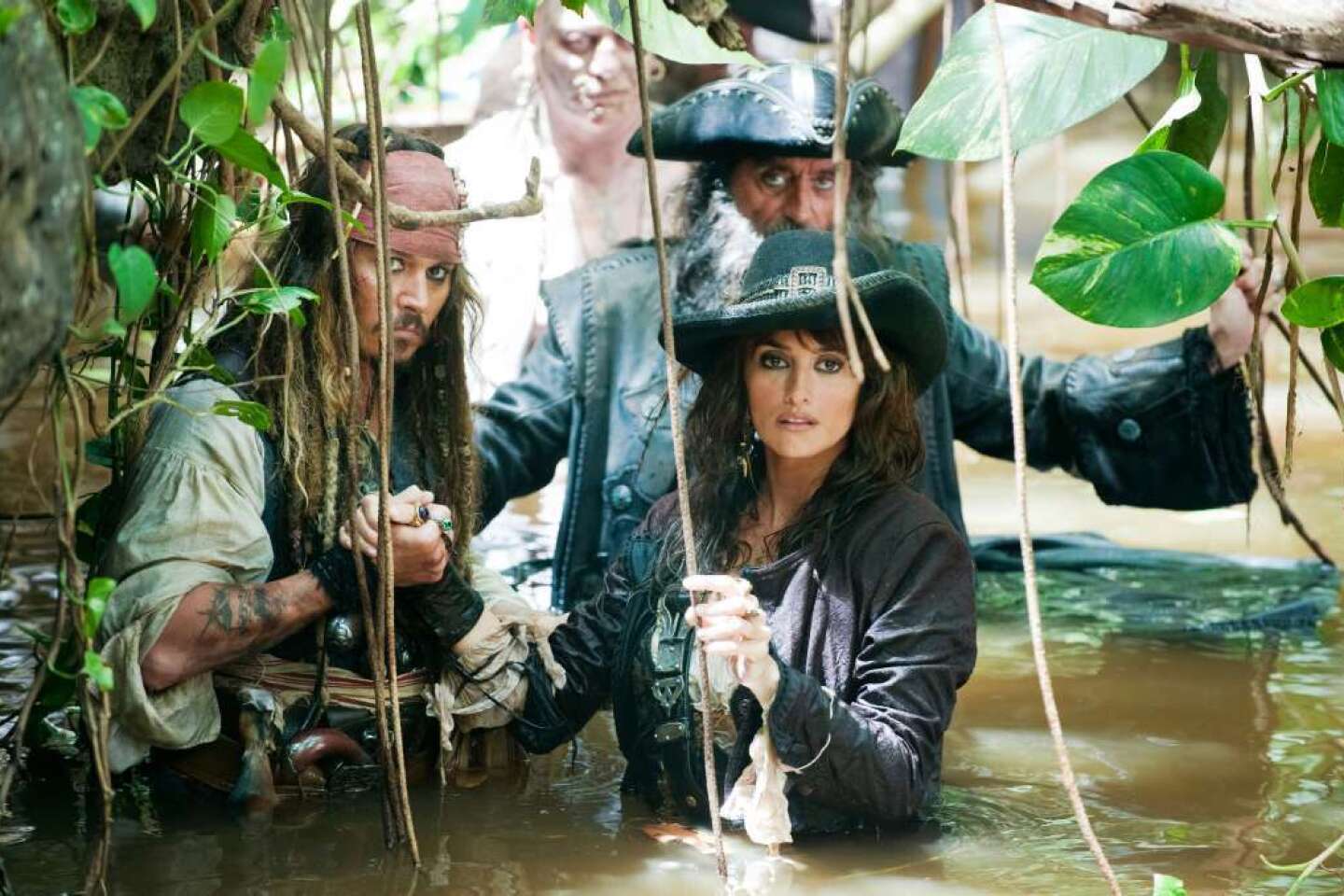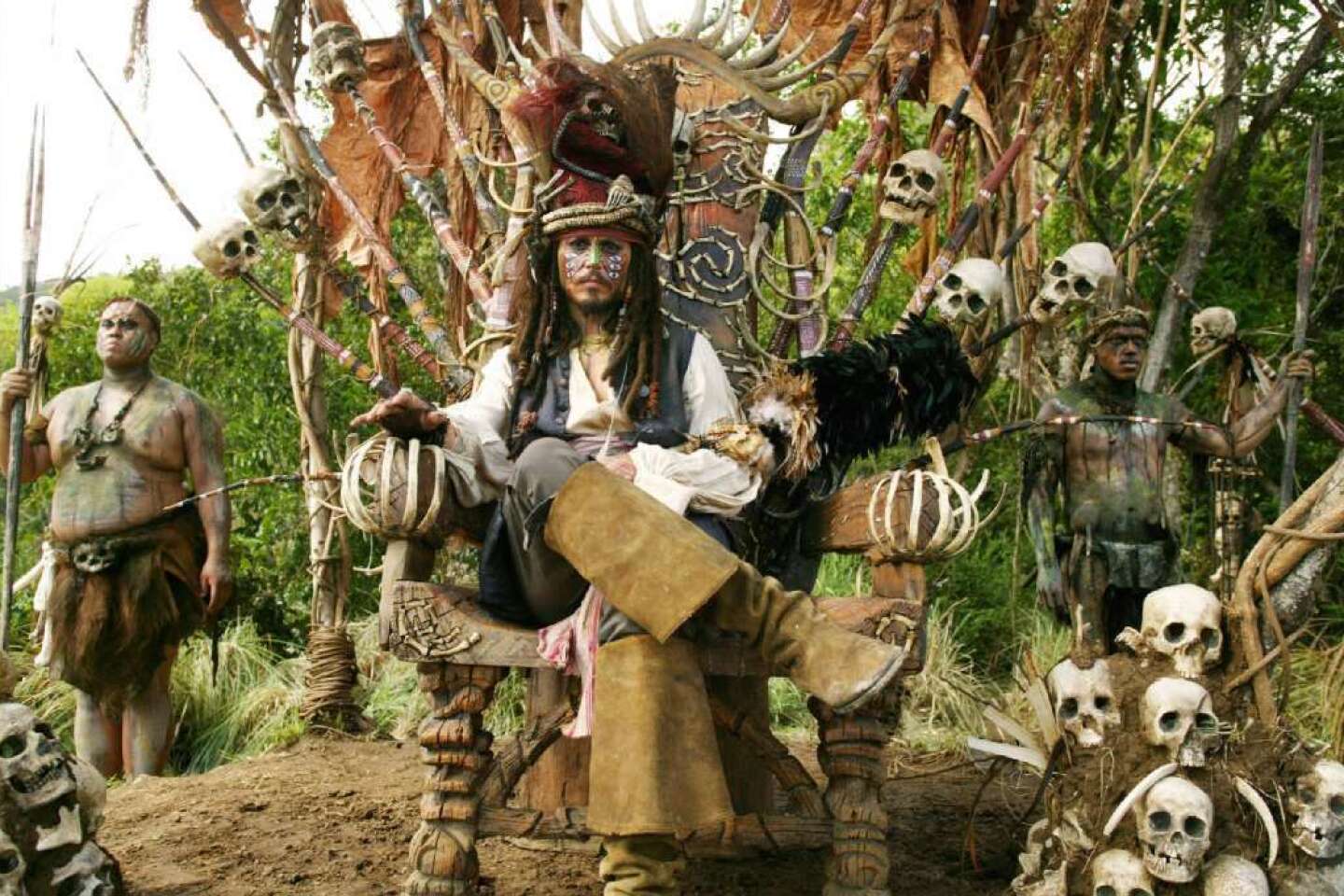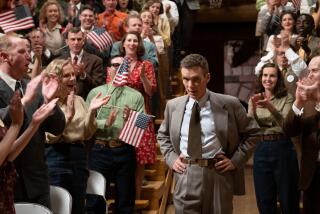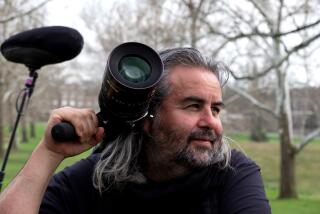Jerry Bruckheimer has something to prove — really
The desk shines, as do rows of Montblanc pens, and everything seems in its place, including the man who appears as if a meticulously dressed whisper. Most of the bottles in the liquor cart have not been opened, but the man, one of Hollywood’s most successful producers, mentions that when a preview goes badly, Scotch and commiseration flow.
One anticipates an explosion or a crack of bravado, but all is civilized in Jerry Bruckheimer’s Santa Monica office, the sanctum of a man who for decades has rattled the walls of movie houses with fighter pilots, pirates, convicts, spooks (intel and other kinds), save-the-world astronauts, a gigolo, a brash Beverly Hills cop and an array of other characters that appear much larger than the impresario in the dark blazer and black loafers.
Bruckheimer, who recently turned 70, is a presence in the hockey rink. But he concedes he is more fragile than he was in the 1980s when “Top Gun” was a hit and girls wanted to dress like Jennifer Beals in “Flashdance.” “It’d be a yard sale if I took a check,” he says, citing the hockey lexicon for getting whacked. “Parts all over the place.”
PHOTOS: Jerry Bruckheimer’s No.1 films for Disney
The producer — his movies have tallied more than $13 billion in global ticket sales — is back in the news. His 23-year partnership with the Walt Disney Co. ends in April; last week he announced he had signed a three-year deal with Paramount Pictures. The agreement returns him to the studio where he found early magic in character-driven action films that quickly slipped into, and at times shaped, popular culture.
That touch was celebrated Thursday night when Bruckheimer received the 27th American Cinematheque Award at the Beverly Hilton. The movie elite mingled with those who chose self park. Helen Mirren, who starred in Bruckheimer’s “National Treasure: Book of Secrets,” called him “a legend.... He knows how to give audiences what they want.”
Ben Kingsley praised him for his dedication to actors: “These days Hollywood heroes are very much in short supply.... You are and always will be one of the good guys.” One of the biggest laughs of the ceremony came when Jon Turteltaub, director of the “National Treasure” series, quipped that “in some small way I’ve helped make you richer. We all have haven’t we? … He taught me how to make a $200-million movie. You start with $100 million.”
Bruckheimer’s time at Disney produced big films including “Armageddon,” “Con Air” and the “Pirates of the Caribbean” franchise. But there were misfires, such as the “Prince of Persia: The Sands of Time” and last summer’s “The Lone Ranger,” which he says was unfairly maligned in the media before its release. Disney took a $190-million loss on the picture, leading to questions about the producer being in sync with a gadget-wielding, technologically frenetic younger generation.
ON LOCATION: Where the cameras roll
When “Top Gun,” which solidified Bruckheimer’s reputation and made Tom Cruise a bankable star, was released in 1986, iPhones and Twitter seemed a galaxy away. But these days the young create and traverse megabytes of scintillation that move swifter than an F-18 off an aircraft carrier, complicating the eternal, unpredictable equation of what makes a movie a blockbuster or a dud.
That strange alchemy can baffle even a man known for his intuition, especially in an era in which three-dimensional special effects are producing one-dimensional characters and single-syllable dialogue.
“Movies [today] catch fire within hours or die in the night,” he says, noting that the whims of the market have become difficult to anticipate. The young “don’t know what they want but they know it when they see it, that’s for sure.”
In his office, Bruckheimer stands before a bookcase — there’s a ladder to reach the top — and nods toward a collection of Jack London stories. Those tales epitomize character versus adversity, man against himself and the elements. “I loved his stuff when I was a kid,” he says. Some of his characters mimic the spirit of London’s wanderers even if they are more hyperbolic and prone to bang-bang denouements.
“If you don’t fall in love with the character you’re lost,” he says. “I don’t care how big the explosions are.”
PHOTOS: Billion-dollar movie club
His split with Disney was in part over character and tone. He says he is seeking “darker and edgier” stories than the studio prefers, half joking that Disney did permit him to “go a little darker [in Pirates] … with a skeleton in the moonlight.”
A new retrospective coffee-table book, “Jerry Bruckheimer: When Lightning Strikes/Four Decades of Filmmaking,” was published by Disney. Thick and heavy as a gravestone, the book, written by Bruckheimer’s publicist Michael Singer, notes that in early stages of filming “Pirates of the Caribbean” some studio executives were “veritably freaking out” about Johnny Depp’s “unconventional, even subversive, interpretation” of antihero Capt. Jack Sparrow.
Bruckheimer’s reemergence at Paramount, which in recent years has been notable for making fewer films, should free him to go deeper into the nether places. “I love movies like ‘Black Hawk Down,’” he says of his 2001 collaboration with director Ridley Scott on the visceral tale of U.S. forces trapped in Somalia.
The producer is also intent on reprising earlier hits, including the 1980s “Beverly Hill’s Cop” series, which is in development to bring back Eddie Murphy as wisecracking Axel Foley. He discounts the notion that such ventures may have the whiff of retreads, saying that success often comes by trading in images and narratives already alive in the popular imagination.
But will the musings and scamperings of Det. Foley still resonate?
PHOTOS: Celebrities by The Times
“As long as he’s interesting and has evolved,” he replies. But he says finances, studio constraints and other pressures can change the scope of a film and that “character development is the first thing that goes on the editing room floor.” Television narratives, including his successful “CSI: Crime Scene Investigation” series, have 13 hours to 24 hours to develop stories and nuance.
Film has two hours, and in the end, the plot must propel; the movie must make money. “It’s called show business,” he says. And these days, he adds, “you have to think about a world market. What’s going to be accepted in China and Russia.”
What is?
“I don’t know,” says Bruckheimer, who has spent time in Russia but not China.
Sunlight streams through windows of his office. It shines on his face, his eyes, his trim reddish-beard. Every centimeter groomed. There is still the trace of a boy in him — the son of German Jewish immigrants with a flop of hair and a camera dangling from his neck. He speaks of “Lawrence of Arabia” and “The Bridge on the River Kwai” and of being young and sitting in the dark of the Mercury Theater in Detroit as the credits rolled.
“I love the process of entertaining people,” says Bruckheimer, who has a wife, Linda, and a daughter, Alexandra. “The rush I get when I sit in the back of a theater.”
That thrill led him from ad man to producer to his early partnership with the late Don Simpson. Bruckheimer once said that he and Simpson — his co-producer on “Flashdance,” “Top Gun” and others — were two parts of the same brain.
“Don was bombastic and extremely intelligent, a salesman,” he says. “I don’t have that in my DNA. I think things out, roll things around in my head. I’m cautious and hard-working.” Bruckheimer is known for a “God is in the details” scrutiny, from visuals to dialogue to music. The Simon & Garfunkel soundtrack in Mike Nichols’ “The Graduate” inspired his hand in song selection and orchestration.
Much of his tenacity is rooted deeper than a filmmaker’s creativity: “Fear of failure,” he says. “You always try to make something better.... Good enough is never the right thing to say to me.”
In his new coffee-table biography, he speaks of his first camera — “that beautiful little plastic and metal box changed my life.” He has been looking through lenses for decades, glimpsing the sublime and the imperfect, always, he says, working to get the image right in film and in life. “I’m taking pictures of the present that becomes the past very soon,” he says.
More to Read
Only good movies
Get the Indie Focus newsletter, Mark Olsen's weekly guide to the world of cinema.
You may occasionally receive promotional content from the Los Angeles Times.













